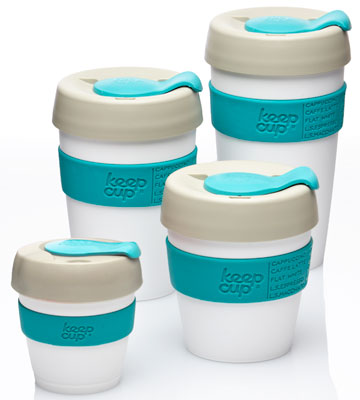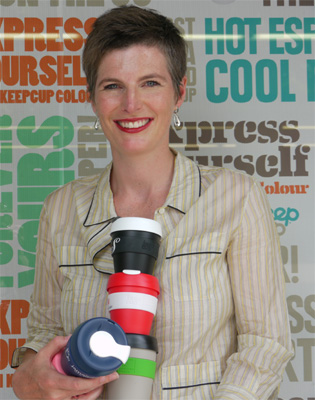Abigail Forsyth KeepCup Interview

Abigail Forsyth KeepCup Interview
Abigail Forsyth is the founder and CEO of KeepCup which is the world's first barista standard reusable cup. Since founding KeepCup in 2009, the brand has developed into a global phenomenon with over 800,000 environmentally conscious commuters adopting the trend.Entrepreneur and mother of two Abigail Forsyth has always been a passionate problem solver. Following her Law and Arts studies at the University of Melbourne, Abigail worked as a solicitor. In 1998, her career path changed significantly when, along with her brother Jamie, Abigail founded Bluebag, a fresh and healthy series of cafés in Melbourne's busy, yet health conscious CBD.
The world of hospitality and the huge quantity of food packaging used within it alarmed Abigail and Jamie and, as such, they began searching for more sustainable and environmentally gentle ways to serve food. Unimpressed and uninspired by the design of reusable cups on the market, Abigail and Jamie decided to design and manufacture their own version. Lightweight and stylish, BPA free and non-toxic, the world's first barista standard reusable cup, KeepCup was born.
Over 800,000 environmentally conscious commuters have now adopted the KeepCup. If we estimate that 80% of these users drink 8 takeaway coffees per week, then over a year, KeepCup users will have diverted 300,000 million disposable cups from landfill. This equates to removing over 4000 tonnes of disposable cups from the waste stream and saving enough energy to power 5000 homes for a year. Furthermore, this leaves 50,000 trees left standing in a forest somewhere - that's a lovely thought.
The first KeepCup was sold in June 2009 and two years on, the brand has developed into a global phenomenon. Abigail heads up the team of over 20 employees, with offices in both Melbourne and London.
From modest beginnings, the KeepCup is now keeping drinks warm throughout Australia, the United Kingdom, New Zealand, USA, South Africa, parts of Asia, and throughout Europe, with plans to broaden their 'Hot Espresso. Cool Earth" footprint even further.
In Melbourne, a city where coffee is a style in itself, leading restaurateurs and café trendsetters have joined the fan club. Seven Seeds, Five Senses, Merlo, Campos and Toby's Estate are but a some of the premium roasters who have got behind the KeepCup. High profile corporate clients including ANZ, NAB, Westpac and QANTAS.
Abigail and the KeepCup brand have changed the way even the most discerning coffee drinkers enjoy their daily dose and she has since been commended in several globally renowned awards. She was a finalist in the City of London's Sustainable City Awards (2010), Premier's Design Awards (2010) and Melbourne Day awards (2010), as well as being shortlisted for the Australian International Design Awards (2010) and the Red Dot Industrial Design Awards Hamburg (2010).
Abigail's leadership and devotion to finding creative solutions to overcome corruption of the environment has been exemplary. For a product that weighs only 61 grams, KeepCup has revolutionised consumer behaviour, having a 'viral effect' worldwide.
www.keepcup.com

Interview with Abigail Forsyth
Question: What inspired the creation of KeepCup?Abigail Forsyth: We own cafés called Bluebag and I was appalled at the packaging waste we went through with the disposable cups and I was interested in making the business more sustainable in all aspects. It was the ubiquity of the coffee cup that appalled me and we looked at buying a reusable cup to sell in the stores but I thought they were all quite ugly. I never wanted to carry a reusable cup because they were either big bulky thermos or a mug that was too heavy to carry.
At Bluebag because we work behind the coffee machine we saw the problems from the point of view of the barista in regards to size and dosage and because some thermos have to be heated prior it takes time and coffee is all about speed as well as deliciousness. These issues were not overcome by any of the cups we could buy ourselves. We thought about going down the road of manufacturing our own but we were quite daunted of the costs in doing that and we wondered if we had a market.
We began with a reusable soup cup that we trialed, we sold soup in the reusable mug in winter and we found that 15% of people bought the mug and reused it; after that we knew we had a market.
I tell the story that we were still talking about the idea, because of the cost involved in the design process, and then my daughter was about 15 months old and I gave her a warm milk in a sippy cup before work in the morning and when I came home she'd have another one and I'd have a take away coffee in the morning and the afternoon; I then thought 'imagine if I gave her, her milk in a disposable cup and then threw it in the bin'! After that I knew I had to do something about that and I knew if I thought it was a problem other people would too.
Question: Can you talk about the idea of being able to circle your preferred drink, on the KeepCup?
Abigail Forsyth: It is an optional thing to do if you have a regular coffee, every morning. The main reason we did that was if you went out and got coffees for four people it's a good way to remember who has what.
Question: Are you surprised that over 800,000 environmentally conscious commuters are adopting the trend of KeepCup?
Abigail Forsyth: Yes! We have had great support from consumers and baristas. The key to our success has been that baristas have seen it in action and they talk about it -it's been viral. The baristas have said that the KeepCup is a great product and that has really helped people have the confidence to walk around and use it because it is something that is quite 'cool' rather than something really 'dorky'.
Question: How important was it to manufacture the KeepCup in Melbourne?
Abigail Forsyth: Very important! It was important as part of our sustainability claims about the cup because we want the product to be generally sustainable in every way. Local manufacture was the key to that.
Moving forward we have done lots of little changes and as we have developed products it has been great to have a relationship with someone who is only an hour drive away from where we are and we can constantly talk to them about the product and improvement. The manufacturer input has been very important to the product from both a usability and sustainability point of view.
Question: What's next for KeepCup?
Abigail Forsyth: We are about to release a KeepCup extra small which is an espresso version of the cup. We know that some mums will purchase the KeepCup extra small for the babycinos. I know when we first marketed KeepCup often it was children who would come up to the stall because of all the bright colours, the KeepCups are very attractive.
Question: What's the hardest business lesson you've learnt and how did you learn it?
Abigail Forsyth: I think the hardest business lesson in my career has been if it's not working stop digging. It takes as much effort and as much focus to run something unsuccessful as it does to run something successfully. When things work they work pretty much straight away.
Question: What advice do you have for other women who want to begin their own business?
Abigail Forsyth: I started KeepCup when I was having children thinking it would be a great little business I could do on the side (laughing). It doesn't happen like that - that would be my advice. There is certain freedom in running your own business and doing it yourself but it is all consuming. In order for something to be successful, that's the way it has to be.
Question: Do you regularly set goals for your business? How do you go about achieving them?
Abigail Forsyth: Yes. We set our goals and then we need to get the buy-in from our team and staff so we are all on board and marching in the same direction. Then, we set a path and go about it that way.
Question: Can you talk about the importance of a business plan?
Abigail Forsyth: We wrote a business plan because we got some funding and a lot of the time the stuff is rattling around in your head anyway. To me, the key thing about a business plan is to get buy-in from other people who are involved, so you can all know what direction you are heading in. Our business has grown so fast that it has been hard to catch up and you can easily stray off in a direction you didn't plan to move in and a business plan is a good touchstone to make sure you're on track to what you set out to do, particularly what your goals are. Our business is a lot about sales, so we added who we were selling to and why you are seeing to them; you need to be clear about that type of thing as well.
Interview by Brooke Hunter
MORE



